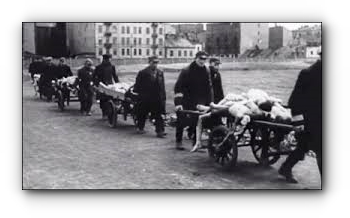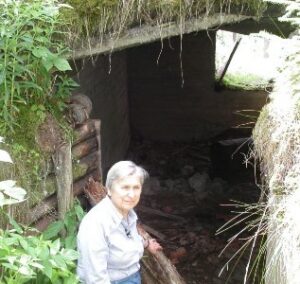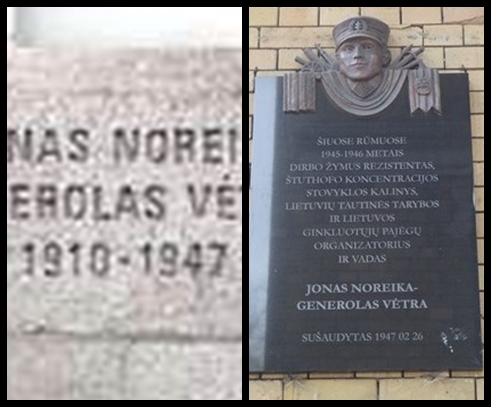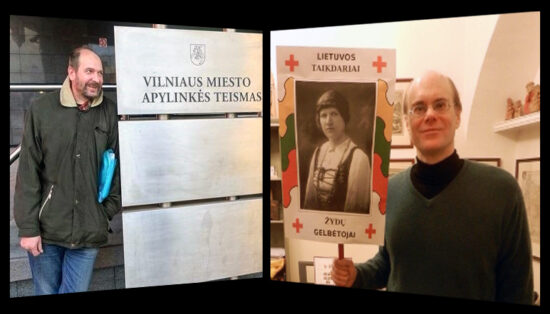[last update]
◊
see also: BOOKS SECTION
[last update]
see also: BOOKS SECTION
In his book Crisis, War and the Holocaust in Lithuania, which I recently reviewed on these pages, historian Saulius Sužiedėlis virulently attacked those who in the past had opposed the Prague Declaration of 2008. When I read the list of signatories to the Prague Declaration signed in 2008, it makes me think of prisoners or detainees becoming free after having spent 45 years between four closed walls.
Getting free in the outside world and knowing next to nothing that has happened in the world at large during their detention. Most of these signatories, people of esteem, some of them heroes in their fight against Communist yoke, have suffered greatly and they yearn for recognition as victims of totalitarian crimes. But the only tangible contemporary phenomenon with some kind of kindred inhuman similitude they want to equate it with is — the Holocaust. So, oblivious to the manifold scourges the twentieth century has known worldwide, they signed on to the conclusion that “both the Nazi and Communist totalitarian regimes should be considered to be the main disasters, which blighted the 20th century” and “recognition of Communism as an integral and common part of Europe’s common history.” The declaration contains the word “same” five times, in support of the declaration’s underlying thesis that Nazi and Soviet crimes are absolutely — the same.
Is it possible to be so self-centered on one’s suffering as to become blind to history?
◊
◊
Ted Dickinson was one of the most remarkable of the International Brigaders, those prescient individuals who fought the fascist forces of Franco, Hitler and Mussolini in the Spanish Civil War. He was born in England and as a child migrated with his family to Australia. At 20, he joined the politically radical Industrial Workers of the World and became one of its leading identities. He was physically impressive, with brown hair, blue eyes, and was described as “strikingly handsome” with a carriage as “straight as a ramrod”.
In 1928, as the economy worsened, Dickinson, with his friend Jim McNeill, campaigned for a better deal for the unemployed and led marches, protests and anti-eviction actions. The pair started a newspaper, Direct Action, and it was because of its radical articles that Dickinson was charged with sedition and imprisoned for six months.
The eminent Harvard and Univ. of Chicago educated American-Lithuanian professor and public affairs analyst, Kęstutis Girnius, tried a decade and a half ago to mobilize support for a far-right inspired dry-clean of the “Lithuanian Activist Front” (LAF, Lietuvių aktyvistų frontas, “white armbanders”) which was the 1941 organization that did not shoot a rabbit when the Soviets were in power (1940-1941) but began to murder thousands of innocent Jewish neighbors the moment the Soviet army started its panicked flight eastward, and there was no authority to stop them. Hitler’s local henchmen declared an “independence” that included the oath of loyalty to Adolf Hitler, the commitment to rid Lithuania of all its Jews, and the unleashing of barbaric murder before the Germans even arrived or set up their control. Any true friend of Lithuania will understand that this is the kind of pro-fascist revisionism that beautiful, modern, tolerant, democratic Lithuania needs like a hole in the head.
Girnius’s gushing public announcement of the new initiative to whitewash the LAF was announced in an article in Delfi.lt this week, heralding the formation of a group of Conservative (Homeland Union party) members of parliament who are forming a “collegium” for this task. If that’s correct, it would, in one fell swoop, undermine the magnificent contributions of so many great truth-telling Lithuanian ethicists of the past three and a half decades, including Vytenis Povilas Andriukaitis, Evaldas Balčiūnas, Saulius Beržinis, Aleksandras Bosas, Valentinas Brandišauskas, Algirdas Brazauskas, Leonidas Donskis, Silvia Foti, Andrius Kulikauskas, Liudas Truska, Rūta Vanagaitė, Nida Vasiliauskaitė, Tomas Venclova, Linas Vildžiūnas, and numerous others.
◊
The following is a full translation of the recent email blast published in Defending History in the original Lithuanian on 31 Jan. For background see the English introduction there, as well as reports and discussion on the DH editor’s Facebook page. For a full chronology of the now nineteen year old campaign against Holocaust survivors who survived by joining the anti-Nazi resistance see DH’s Blaming the Victims page. Obersvers have noted that the German teacher recruited to launch the campaign of defamation against Fania Yocheles Brantsovsky (Brancovskaja) and Dr. Rokhl (Rachel) Margolis, I. Tumavičiūtė in a January 2008 article in a far-right antisemitic daily (original; English translation) reappears this week as the campaign, apparently including the Genocide Center (GRRLC) and its director, is duly relaunched. Note the text contains the link to the online clip from a Soviet-era documentary where Fania Brantsovsky’s remarks about regrettable civilian casualties during the partisans’ battles against the Nazis in the forests of Lithuania is maliciously taken out of context to imply targeting of civilians and/or her own participation in the battle described. The youtube video clip, that has been up for seven years is entitled “isgama branvcovskaja” that translates as “The Degenerate Brantsovsky” or “Scum Brantsovsky.” More background of “polite” state support for the defamation of Holocaust Survivors who joined the anti-Nazi resistance includes the public statement for a video documentary by the executive director of the state-sponsored “Red-Brown Commission” (officially “The International Commission for the Evaluation of the Crimes of the Nazi and Soviet Occupational Regimes in Lithuania”). The participation of the state-sponsored Genocide Center in this week’s events is apparently meant to give the new campaign an air of legitimacy, during a time of much-heightened antisemitic sentiment.
◊
https://www.genocid.lt/centras/lt/4535/a/
COMMEMORATION of Kaniūkai Village Residents, Murdered by Soviet Partisans in 1944
February 2, 2025
10:30 AM – Holy Mass at St. Ignatius Church (Vilnius)
11:30 AM – Departure for Kaniūkai village cemetery (Šalčininkai district) after the Holy Mass
2:00 PM – Start of the commemoration event
Participants:
Dr. Arūnas Bubnys, General Director of GRRCL
(by Z. Jabotinsky, following the Berdichev pogrom, from Jabotinsky. A Life by Hillel Halkin, Yale University Press, 2014)
◊
You are from Hashomer Hatsair? Mordecai asked me. Yes, I still remember the Zionists from Vienna.” Surprisingly the man who asked Chaika Grossman the question was an Austrian, officer in the Wehrmacht, stationed in Vilna (now Vilnius, Lithuania), who later was captured and killed by the Nazis because, as Grossman remembered, he was
“a tall officer, Schmidt, who served in the Vilna occupation army (…) He headed a collection station for soldiers who had lost their units. Cars and all kinds of papers were at his disposal. In short, the officer began a rescue operation.”
(from The Underground Army – Fighters of the Bialystok Ghetto, by Chaika Grossman, Holocaust Library, New York, 1987; she survived the war, emigrated to Israel and became a member of the Knesset)
So, one Wehrmacht officer who helped the Jews living underground outside the Vilna Ghetto. Is this enough to redeem the honor of Germany and Austria? Is this even worth mentioning at all when focusing not on individual heroism but on the bigger picture of what it is that happened?
I have long believed in the collective guilt of the German and Austrian nations in the perpetration of the Holocaust. That is my opinion.
◊
A few days ago I was flabbergasted when I read a news item in the FOCUS website for West-Flanders where I live. On Saturday, August 24, 2024, in Zeebrugge there had been a commemoration ceremony for the crews of two German submarines (U-5 and UC-14) sunk during World War I and just recently identified. This official commemoration ceremony took place in the presence of the German ambassador Martin Kotthaus and the Governor for West-Flanders Carl Decaluwé: “More than one hundred years ago, the crews of these two submarines died in the middle of a horrible war. I am very grateful that today we can grieve for the dead together as friends and partners,” declared the current German ambassador.
It is perhaps interesting to remind readers that in the past Flanders had already made a wrong choice regarding the only illustration for World War I within the ‘Flemish Canon’ (see my article, “Wrong Choice for New “Flemish Canon”). On that occasion, the choice was of a statue of a grieving couple situated in the German military cemetery of Vladslo in Flanders, a couple grieving for their slain son Peter, a German soldier who had died while his regiment attacked Ypres in October 1914, just when the danger of the whole of Belgium being overrun by the German army had been at its highest.
Simon Wiesenthal recounted that he escaped the threat of imminent death seven times as a slave and captive of the Nazis during World War II. Frida Michelson, a Latvian Jew from Riga, escaped an imminent death when on December 8, 1941, moments before she would have been ordered into a grave to be shot in Rumbula, she threw herself on the ground in the snow and pretended to be dead. She was saved by the fact that hundreds of pairs of shoes were piled on her body covering her from the eyes of the murderers, who did not discover her. Otherwise, she would not have told her story to David Silberman.[1]
◊
The sacred cause of democratic Ukraine’s success and brutal dictator Putin’s failure must not be comprised by attempted hijacks by far-right Holocaust revisionists who have worked for decades to rewrite the history into “two equal Holocausts” (“Double Genocide”), an insidious form of revisionism whose first corollary is glorification of local Holocaust collaborators and perpetrators (whether Noreika in Lithuania or Bandera in Ukraine, among numerous others). It is alarming to read this week (on the website of the Lithuanian Foreign Ministry) that Lithuania’s state-sponsored “Commission for the Evaluation of Crimes of the Nazi and Soviet Occupational Regimes in Lithuania” (for short: “the Red-Brown Commission”), the cause of so much pain to the last Holocaust survivors and the remnants of Lithuanian Jewry, is now interloping in Kyiv, attempting to insinuate Double Genocide Holocaust revisionism right into the current noble struggle of the free states of NATO and the European Union to ensure the future of free and democratic Ukraine. Resignations over the years from the “Red-Brown Commission” (all on matters of principle) include Sir Martin Gilbert, Professor Konrad Kwiet and Professor Dov Levin.
Until the age of seventeen I did not know at all that there were Jews. Following from that, I had moreover never heard anything of what happened to the Jews during World War II. My awakening came one evening in the fall of 1962.
I saw Frédéric Rossif’s documentary on the Warsaw Ghetto, Le Temps du Ghetto (‘The Time of the Ghetto’). I came away devastated, particularly shocked by the scenes of the starving children begging in the streets and by the “morning collection” of nude bodies picked up from the pavements and streets of Warsaw and transported by wheelbarrows and carts to a mass grave where the bodies were dumped without any respect. The images were at once revolting and unforgettable.

Screenshot from my ‘first shock’: Frédéric Rossif’s documentary on the Warsaw Ghetto, Le Temps du Ghetto (‘The Time of the Ghetto’)
Compilation of articles, documentaries, videos, and photos. Plus: from the saga of 2008…
See Defending History’s Fania Yocheles Brantsovsky Section
Update: See now the Following Fania project

Fania Yocheles Brantsovsky: “My last wish is that the Jewish Partisan Fort, where we lived, loved and fought the Nazis in the forests of Lithuania, be preserved and restored so future generations will know of our resistance against genocide, and so we honor all those who fell fighting for the freedom of all of us.”
VILNIUS—B’nai B’rith Australia & New Zealand today issued the following press release accompanying its lifetime achievement award earlier this month to Lithuanian filmmaker Saulius Beržinis (see also DH’s report on the dramatic saga in the background).
A few weeks ago my wife and I visited a number of British Commonwealth military cemeteries from World War I in Belgium’s Ypres area, which is in western Flanders, the Dutch-speaking region in the north of Belgium. Starting in October 1914, Ypres had been attacked by considerable German forces but held its ground and remained part of the Allies’ front line until November 1917 when the line was joined by Anzac and Canadian soldiers, going on to reach Passendale, thus breaching the German army’s hold on the Ypres Salient in the west of Belgium.
I always feel a deep admiration for all those young men, the young privates as well as their officers who were sometimes much older. I come to see there graves in these Commonwealth military cemeteries. They were young men who came from New Zealand, Canada, Australia, South Africa, Wales, Ireland and Northern Ireland, England, and Scotland. They also came from India and Nepal and fought here in Belgium as volunteers, career soldiers or conscripted troops, to defend “brave little Belgium.” In Western Flanders, there are hundreds of such cemeteries where courageous men were laid to rest in what has been poetically termed “Flanders’ Fields,” a place that is forever British, with places of worship and by way of a common memory.
UPDATE OF JULY 2023: NOREIKA PLAQUE COMES DOWN FOR NATO CONFERENCE. FOR HOW LONG?
UPDATE OF JULY 2022: Foti’s The Nazi’s Granddaughter is reissued with the new title Storm in the Land of Rain
 Sylvia Foti’s major new book is widely available in English and Lithuanian, among other languages. QUESTION: Why is the center of Vilnius still blighted by an upgraded plaque & bas-relief (right) and a central boulevard marble slab glorifying Hitler collaborator Jonas Noreika, who masterminded the death of thousands of Jews, and touted his unadulterated hate for Jewish fellow citizens in a prewar book? Why do Western diplomats, and most visiting American, British and Israeli Jewish dignitaries feel obliged to avoid even the most polite critique of these prominent carbuncles on the face of the European Union? Surely, a true friend of Lithuania would want the best for Lithuania and its international stature, even if a small far-right “history rewriting elite” might feel offended.
Sylvia Foti’s major new book is widely available in English and Lithuanian, among other languages. QUESTION: Why is the center of Vilnius still blighted by an upgraded plaque & bas-relief (right) and a central boulevard marble slab glorifying Hitler collaborator Jonas Noreika, who masterminded the death of thousands of Jews, and touted his unadulterated hate for Jewish fellow citizens in a prewar book? Why do Western diplomats, and most visiting American, British and Israeli Jewish dignitaries feel obliged to avoid even the most polite critique of these prominent carbuncles on the face of the European Union? Surely, a true friend of Lithuania would want the best for Lithuania and its international stature, even if a small far-right “history rewriting elite” might feel offended.
◊
The best way to reach the mass killing site in Garliava (Yiddish Gúdleve, Polish Godlewo), is to take a train from the central train station in Kaunas. It is just one stop. The railway runs south, through a picturesque valley of the languid river Jiesia. Garliava is a township historically in the Suwałki region. It is named after an ancient landlord and noble family Godlewski. It seems that twentieth century ethnic purity zealots renamed the township into Garliava to sever any obvious link to the personage commemorated by the town’s naming, thereby reducing the historical chronicle of the entire region to a narrow and assertively ethnonationalist narrative
When you step out of the old railway station in Garliava, the town itself is still one kilometer away. The train line and the station were built in 1862, and one can wonder, what the point was, with the then cutting-edge train technology of the time, to make a long detour around the town and build the station somewhere in the middle of the fields, or as one might put it, right in the middle of nowhere?
◊
◊
 Genuine heroes of this saga—both written out of the film
Genuine heroes of this saga—both written out of the film◊
VILNIUS—Michael Kretzmer’s new documentary J’Accuse! provides a terrific extended interview with legendary truth-teller Silvia Foti. The film’s narration provides effective statements on ongoing East European state adulation of Nazi collaborators though focused on just one, Jonas Noreika of Lithuanian Holocaust infamy (who was the Chicago-born Foti’s grandfather).
We are accustomed to the frequent excellence of BBC broadcasts, documentaries, and investigative reports. On January 23, 2023, with its documentary How the Holocaust Began featuring historian James Bulgin, BBC 2 struck a welcoming chord, demonstrating powerfully and convincingly that the Holocaust ― in the sense of the genocide per se, unleashed upon Operation Barbarossa in June 1941 ― started in the Baltic States of Lithuania and Latvia.
Through the works of Michaël Prazan (Einsatzgruppen as a book and TV documentary in French), Efraim Zuroff’s untiring crusade against the states in Eastern Europe that still cover up their complicity in the murder of millions of Jews during World War II (see his renowned book Operation Last Chance and the site of the same name at the Wiesenthal Center in Jerusalem), through the vigorous and constant series of articles on in the web journal Defending History (see also the documentary Rewriting History by Danny Ben Moshe), we, the attentive and honest readers know what the reality of the Holocaust had been in the Baltic States when Jews were hunted as animals, slaughtered as animals by the German forces, and in many cases before they even arrived, also by the local populations “activists.”. We are cognoscenti but it is reassuring to see that the BBC broadcasts an image of far-reaching collaboration by the local populations in the Baltic States with the focus primarily on Lithuania.
◊
◊
Editor’s memoir
In 2011, when our small Defending History team headed out (as we did each year) to Kaunas to monitor and document the 2011 neo-nazi city center march, an event that glorified Holocaust collaborators, we went for a coffee after the event. There, our mentor who never missed a march before his final illness, Milan Chersonski (1937–2021), the longtime Vilnius Yiddish theatre director and editor for some dozen years of the Lithuanian Jewish community’s quadrilingual newspaper, Jerusalem of Lithuania, told us (in Yiddish, of course): “Look, there is one young Lithuanian who has more courage than the rest of the country combined. He has been writing articles on the tragedy of his country’s government organs glorifying Holocaust collaborators in the public space. And unlike others, he’ll be happy for Defending History to publish them in English translation. Trust me, his articles are more important that all of ours that come from Jewish pens.”
Annelies Beck is a Flemish journalist whom I admire. She is a tough cookie. I have often seen her interviewing politicians and admired her determination, intelligence and open-mindedness. So, I was quite curious to read her opinion piece in the literary supplement of the Flemish language De Standaard dated November 26, 2022, entitled “History is Far From Gone” and relating to a conference in Lithuania she went to on the subject of the role of public television within democracies. She is also a writer. In her opinion piece, she focuses on what the Lithuanians did during the Soviet occupations to protect and preserve their language: “The Lithuanians whom I later questioned declared the importance of resistance through language and literature (…) in different periods of their history.” While visiting, Mrs. Beck was impressed by what she saw “in a cell in the cellar of the Genocide Museum,” imagining all the prisoners during the Soviet occupation, symbolized by the eighteen different layers of color having been necessary to wipe out all the graffiti they had scratched on the walls. She also writes, referring to a conversation she had with a Lithuanian journalist colleague, “that some heroic partisans were also antisemites” (no mention that many of those glorified were in fact recycled 1941 Holocaust perpetrators).